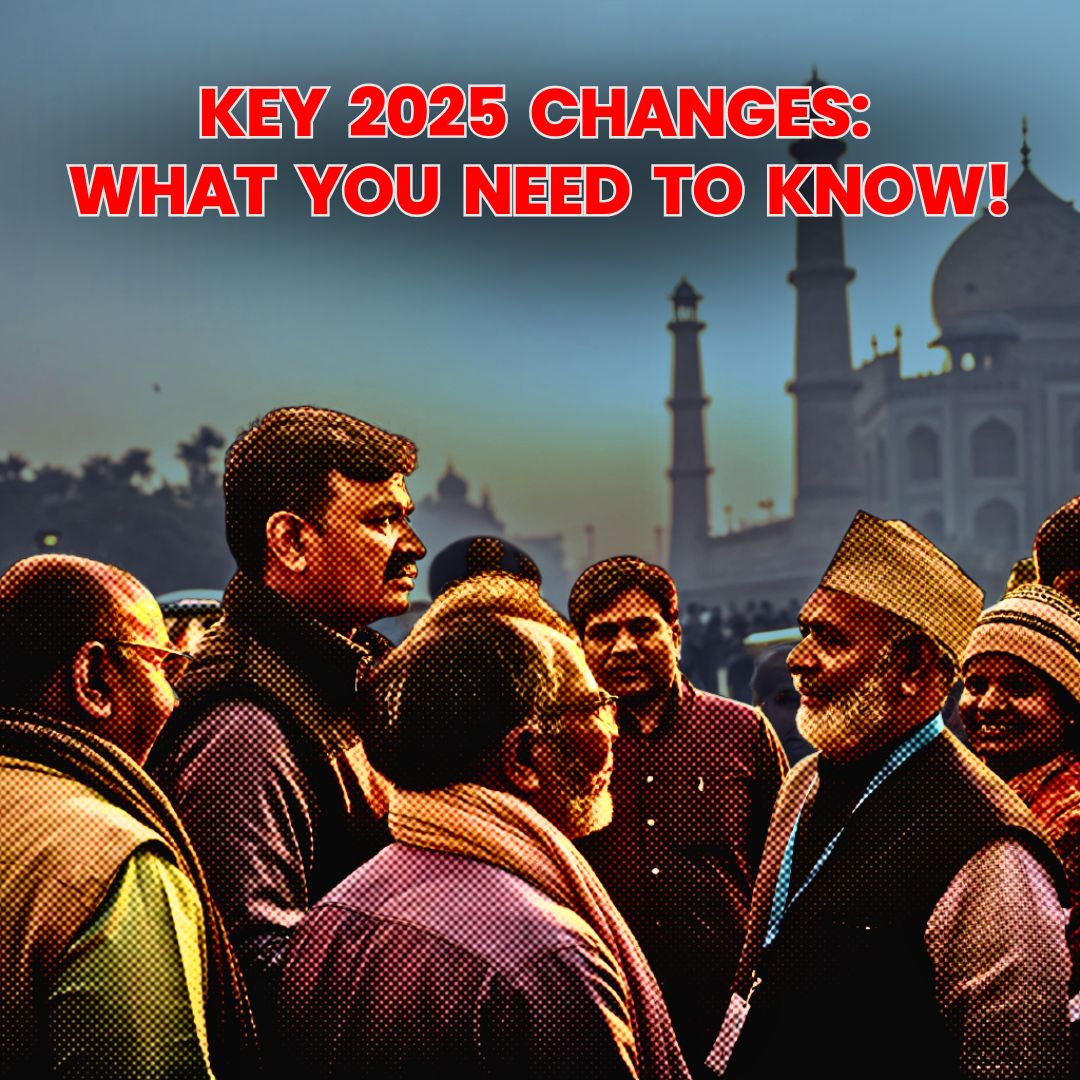Starting January 1, 2025, India will implement significant updates across various sectors, impacting individuals and businesses. Key changes include mandatory Multi-Factor Authentication for GST compliance, revised visa appointment rescheduling for non-immigrant applicants, increased loan limits for farmers, and adjustments in LPG cylinder pricing.
Additionally, UPI transaction limits will double from ₹5,000 to ₹10,000, and the Bombay Stock Exchange will change the expiry dates for derivatives from Fridays to Tuesdays. Stakeholders such as taxpayers, visa applicants, farmers, and consumers should prepare for these changes to adapt effectively.
Overview of Changes
As we approach this pivotal date, understanding these updates is crucial for effective planning and adaptation.
1. GST Compliance Updates
Mandatory Multi-Factor Authentication (MFA): To enhance security, the Goods and Services Tax (GST) compliance will now require all taxpayers to implement Multi-Factor Authentication (MFA) when accessing GST portals. This involves updating mobile numbers for OTPs and ensuring that employees are trained on the new system.
E-Way Bill Restrictions: The generation of E-Way Bills will be restricted to base documents not older than 180 days. Businesses must align their invoicing and logistics processes with this new rule to avoid disruptions.
2. Visa Processing Changes
US Visa Appointment Rescheduling: Starting January 1, 2025, non-immigrant visa applicants in India will be allowed to reschedule their appointments free of charge once. Any further changes will necessitate a reapplication and payment of fees.
H-1B Visa Process Overhaul: New regulations aimed at modernising the H-1B visa process will come into effect on January 17, 2025. These changes are designed to provide greater flexibility for employers and streamline the process for Indian F-1 visa holders.
3. LPG Pricing Adjustments
Revised LPG Cylinder Prices: The prices of LPG cylinders—both domestic and commercial—will be adjusted from January 1, 2025. Although specific price changes have yet to be disclosed, consumers should brace for potential increases.
4. EPFO Pension Withdrawal Simplification
Starting January 1, 2025, pensioners under the Employees’ Provident Fund Organisation (EPFO) will be able to withdraw their pensions from any bank without needing additional verification. This change aims to simplify the withdrawal process, making it more accessible for retirees.
5. UPI Transaction Limit Increase
The transaction limit for UPI 123Pay will double from ₹5,000 to ₹10,000 effective January 1, 2025. This adjustment provides users of feature phones greater flexibility in conducting financial transactions.
6. Increased Loan Limits for Farmers
In a significant boost for the agricultural sector, farmers will now be eligible for loans up to ₹2 lakh without any guarantee starting January 1, 2025. This increase from the previous limit of ₹1.6 lakh aims to enhance access to funds for agricultural activities and improve productivity.
7. Financial Transaction Updates
The Reserve Bank of India (RBI) has introduced changes affecting fixed deposits and credit card guidelines that will take effect in January 2025. These updates include new rules regarding public deposits by non-banking financial companies and housing finance firms.
New Fixed Deposit Rules: The RBI has introduced new guidelines for fixed deposits (FDs) with Non-Banking Financial Companies (NBFCs) and Housing Finance Companies (HFCs). These rules include revised terms for premature withdrawals, allowing depositors to withdraw small amounts without interest within three months.
Changes in Credit Card Benefits: New RBI guidelines affecting credit card usage will require users to meet specific spending thresholds to access benefits like airport lounge access. This change may impact how consumers manage their credit card expenditures.
8. Updates on Share Market Expiry Rules
Starting January 1, 2025, the Bombay Stock Exchange will implement changes to the expiry dates for derivatives related to Sensex and other indices, shifting from Fridays to Tuesdays. This adjustment is significant for investors and traders in the stock market as it may affect trading strategies and market dynamics.
9. ATM Withdrawals for EPF Funds
A noteworthy addition is the introduction of an ATM service for Employees’ Provident Fund (EPF) account holders, allowing them to withdraw their funds conveniently through ATMs. This feature enhances accessibility and provides a quick solution for urgent financial needs.
10. Aviation Fuel Price Adjustments
While LPG prices were mentioned earlier, there is also an expectation of revisions in aviation fuel prices starting January 1, 2025. This change could lead to increased airfare costs, impacting travellers and airlines alike.
11. Mobile Data Charges
Telecom companies such as Jio, Airtel, and Vodafone are expected to revise their mobile data charges starting January 1, 2025. Specific details about these adjustments have not been extensively covered but may impact consumer expenses significantly.
12. Bank Holidays Confusion
There is uncertainty regarding whether banks will be closed on January 1, 2025. While it may be a restricted holiday in some regions due to New Year’s Day celebrations, clarity is still needed as the Reserve Bank of India (RBI) has not released its holiday list for the year.
Summary of Changes
To summarise, here are the key changes coming into effect on January 1, 2025:
- Mandatory MFA for GST compliance
- Changes in US visa appointment rescheduling
- Revised LPG cylinder pricing
- Simplified EPFO pension withdrawal process
- Increased UPI transaction limits
- Higher loan limits for farmers
- New fixed deposit rules with NBFCs
- Adjusted credit card benefits criteria
- Shift in share market expiry rules
- ATM withdrawals available for EPF funds
- Adjustments in aviation fuel prices
- Potential increases in mobile data charges
- Uncertainty about bank holidays
Conclusion
The upcoming changes set to take effect from January 1, 2025, represent a pivotal moment for individuals and businesses in India. From enhanced security measures in GST compliance to significant adjustments in financial transactions and agricultural support, these updates necessitate careful planning and adaptation. It is essential for individuals and businesses alike to prepare proactively for these changes as they will significantly impact every aspect of life and finance in India as we enter the new year.
The Logical Indian’s Perspective
These impending changes present opportunities for growth and development across various sectors in India. It is important for stakeholders to engage with these updates constructively, encouraging dialogue and fostering understanding among communities impacted by these regulations. As the country navigates this transformative period, promoting mutual respect and understanding can contribute to a more harmonious society. How might these changes affect your daily life or business operations? Feel free to share your thoughts in the comments below.












